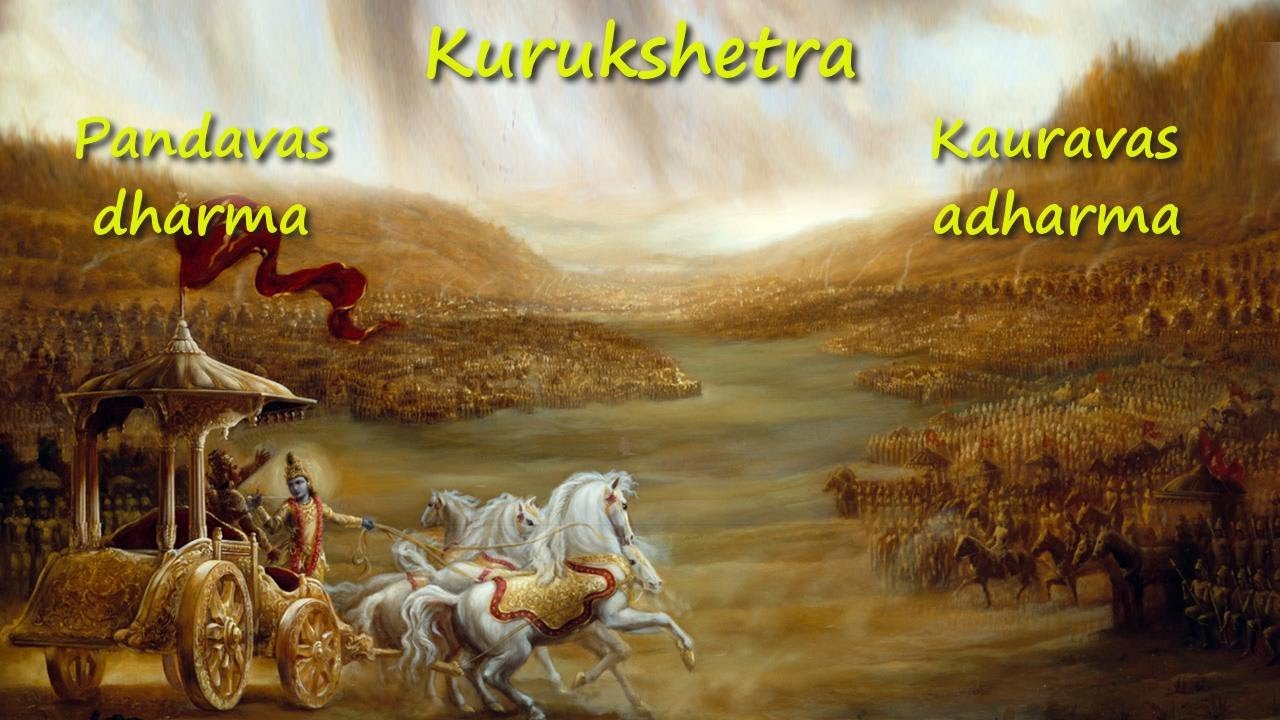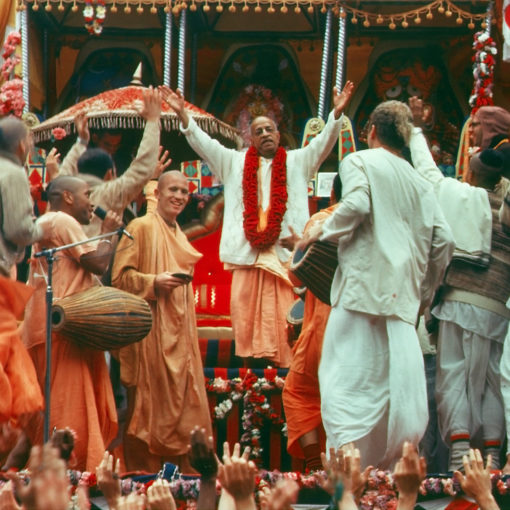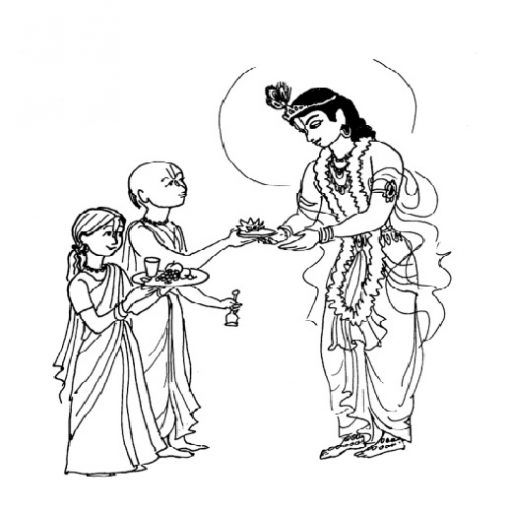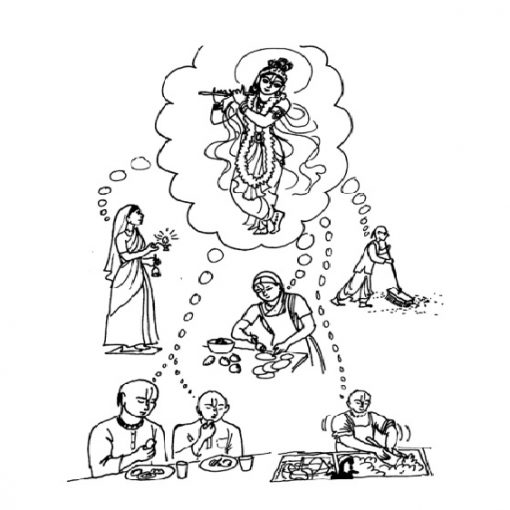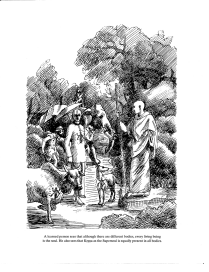dharma-kṣetre kuru-kṣetre
samavetā yuyutsavaḥ
māmakāḥ pāṇḍavāś caiva
kim akurvata sañjaya
Synonyms
dhṛtarāṣṭraḥ uvāca — King Dhṛtarāṣṭra said; dharma–kṣetre — in the place of pilgrimage; kuru–kṣetre — in the place named Kurukṣetra; samavetāḥ — assembled; yuyutsavaḥ — desiring to fight; māmakāḥ — my party (sons); pāṇḍavāḥ — the sons of Pāṇḍu; ca — and; eva — certainly; kim — what; akurvata — did they do; sañjaya — O Sañjaya.
Translation
Dhṛtarāṣṭra said: O Sañjaya, after my sons and the sons of Pāṇḍu assembled in the place of pilgrimage at Kurukṣetra, desiring to fight, what did they do?
dṛṣṭvā tu pāṇḍavānīkaṁ
vyūḍhaṁ duryodhanas tadā
ācāryam upasaṅgamya
rājā vacanam abravīt
Synonyms
sañjayaḥ uvāca — Sañjaya said; dṛṣṭvā — after seeing; tu — but; pāṇḍava–anīkam — the soldiers of the Pāṇḍavas; vyūḍham — arranged in a military phalanx; duryodhanaḥ — King Duryodhana; tadā — at that time; ācāryam — the teacher; upasaṅgamya — approaching; rājā — the king; vacanam — words; abravīt — spoke.
Translation
Sañjaya said: O King, after looking over the army arranged in military formation by the sons of Pāṇḍu, King Duryodhana went to his teacher and spoke the following words.
ācārya mahatīṁ camūm
vyūḍhāṁ drupada-putreṇa
tava śiṣyeṇa dhīmatā
Synonyms
Translation
O my teacher, behold the great army of the sons of Pāṇḍu, so expertly arranged by your intelligent disciple the son of Drupada.
bhīmārjuna-samā yudhi
yuyudhāno virāṭaś ca
drupadaś ca mahā-rathaḥ
Synonyms
Translation
Here in this army are many heroic bowmen equal in fighting to Bhīma and Arjuna: great fighters like Yuyudhāna, Virāṭa and Drupada.
kāśirājaś ca vīryavān
purujit kuntibhojaś ca
śaibyaś ca nara-puṅgavaḥ
Synonyms
Translation
There are also great heroic, powerful fighters like Dhṛṣṭaketu, Cekitāna, Kāśirāja, Purujit, Kuntibhoja and Śaibya.
uttamaujāś ca vīryavān
saubhadro draupadeyāś ca
sarva eva mahā-rathāḥ
Synonyms
yudhāmanyuḥ — Yudhāmanyu; ca — and; vikrāntaḥ — mighty; uttamaujāḥ — Uttamaujā; ca — and; vīrya–vān — very powerful; saubhadraḥ — the son of Subhadrā; draupadeyāḥ — the sons of Draupadī; ca — and; sarve — all; eva — certainly; mahā–rathāḥ — great chariot fighters.
Translation
There are the mighty Yudhāmanyu, the very powerful Uttamaujā, the son of Subhadrā and the sons of Draupadī. All these warriors are great chariot fighters.
tān nibodha dvijottama
nāyakā mama sainyasya
saṁjñārthaṁ tān bravīmi te
Synonyms
asmākam — our; tu — but; viśiṣṭāḥ — especially powerful; ye — who; tān — them; nibodha — just take note of, be informed; dvija–uttama — O best of the brāhmaṇas; nāyakāḥ — captains; mama — my; sainyasya — of the soldiers; saṁjñā–artham — for information; tān — them; bravīmi — I am speaking; te — to you.
Translation
But for your information, O best of the brāhmaṇas, let me tell you about the captains who are especially qualified to lead my military force.
kṛpaś ca samitiṁ-jayaḥ
aśvatthāmā vikarṇaś ca
saumadattis tathaiva ca
Synonyms
bhavān — your good self; bhīṣmaḥ — Grandfather Bhīṣma; ca — also; karṇaḥ — Karṇa; ca — and; kṛpaḥ — Kṛpa; ca — and; samitim–jayaḥ — always victorious in battle; aśvatthāmā — Aśvatthāmā; vikarṇaḥ — Vikarṇa; ca — as well as; saumadattiḥ — the son of Somadatta; tathā — as well as; eva — certainly; ca — also.
Translation
There are personalities like you, Bhīṣma, Karṇa, Kṛpa, Aśvatthāmā, Vikarṇa and the son of Somadatta called Bhūriśravā, who are always victorious in battle.
mad-arthe tyakta-jīvitāḥ
nānā-śastra-praharaṇāḥ
sarve yuddha-viśāradāḥ
Synonyms
Translation
There are many other heroes who are prepared to lay down their lives for my sake. All of them are well equipped with different kinds of weapons, and all are experienced in military science.
balaṁ bhīṣmābhirakṣitam
paryāptaṁ tv idam eteṣāṁ
balaṁ bhīmābhirakṣitam
Synonyms
aparyāptam — immeasurable; tat — that; asmākam — of ours; balam — strength; bhīṣma — by Grandfather Bhīṣma; abhirakṣitam — perfectly protected; paryāptam — limited; tu — but; idam — all this; eteṣām — of the Pāṇḍavas; balam — strength; bhīma — by Bhīma; abhirakṣitam — carefully protected.
Translation
Our strength is immeasurable, and we are perfectly protected by Grandfather Bhīṣma, whereas the strength of the Pāṇḍavas, carefully protected by Bhīma, is limited.
yathā-bhāgam avasthitāḥ
bhīṣmam evābhirakṣantu
bhavantaḥ sarva eva hi
Synonyms
Translation
All of you must now give full support to Grandfather Bhīṣma, as you stand at your respective strategic points of entrance into the phalanx of the army.
kuru-vṛddhaḥ pitāmahaḥ
siṁha-nādaṁ vinadyoccaiḥ
śaṅkhaṁ dadhmau pratāpavān
Synonyms
tasya — his; sañjanayan — increasing; harṣam — cheerfulness; kuru–vṛddhaḥ — the grandsire of the Kuru dynasty (Bhīṣma); pitāmahaḥ — the grandfather; siṁha–nādam — roaring sound, like that of a lion; vinadya — vibrating; uccaiḥ — very loudly; śaṅkham — conchshell; dadhmau — blew; pratāpa–vān — the valiant.
Translation
Then Bhīṣma, the great valiant grandsire of the Kuru dynasty, the grandfather of the fighters, blew his conchshell very loudly, making a sound like the roar of a lion, giving Duryodhana joy.
paṇavānaka-gomukhāḥ
sahasaivābhyahanyanta
sa śabdas tumulo ’bhavat
Synonyms
tataḥ — thereafter; śaṅkhāḥ — conchshells; ca — also; bheryaḥ — large drums; ca — and; paṇava–ānaka — small drums and kettledrums; go–mukhāḥ — horns; sahasā — all of a sudden; eva — certainly; abhyahanyanta — were simultaneously sounded; saḥ — that; śabdaḥ — combined sound; tumulaḥ — tumultuous; abhavat — became.
Translation
After that, the conchshells, drums, bugles, trumpets and horns were all suddenly sounded, and the combined sound was tumultuous.
mahati syandane sthitau
mādhavaḥ pāṇḍavaś caiva
divyau śaṅkhau pradadhmatuḥ
Synonyms
tataḥ — thereafter; śvetaiḥ — with white; hayaiḥ — horses; yukte — being yoked; mahati — in a great; syandane — chariot; sthitau — situated; mādhavaḥ — Kṛṣṇa (the husband of the goddess of fortune); pāṇḍavaḥ — Arjuna (the son of Pāṇḍu); ca — also; eva — certainly; divyau — transcendental; śaṅkhau — conchshells; pradadhmatuḥ — sounded.
Translation
On the other side, both Lord Kṛṣṇa and Arjuna, stationed on a great chariot drawn by white horses, sounded their transcendental conchshells.
devadattaṁ dhanañ-jayaḥ
pauṇḍraṁ dadhmau mahā-śaṅkhaṁ
bhīma-karmā vṛkodaraḥ
Synonyms
pāñcajanyam — the conchshell named Pāñcajanya; hṛṣīka–īśaḥ — Hṛṣīkeśa (Kṛṣṇa, the Lord who directs the senses of the devotees); devadattam — the conchshell named Devadatta; dhanam–jayaḥ — Dhanañjaya (Arjuna, the winner of wealth); pauṇḍram — the conch named Pauṇḍra; dadhmau — blew; mahā–śaṅkham — the terrific conchshell; bhīma–karmā — one who performs herculean tasks; vṛka–udaraḥ — the voracious eater (Bhīma).
Translation
Lord Kṛṣṇa blew His conchshell, called Pāñcajanya; Arjuna blew his, the Devadatta; and Bhīma, the voracious eater and performer of herculean tasks, blew his terrific conchshell, called Pauṇḍra.
kuntī-putro yudhiṣṭhiraḥ
nakulaḥ sahadevaś ca
sughoṣa-maṇipuṣpakau
śikhaṇḍī ca mahā-rathaḥ
dhṛṣṭadyumno virāṭaś ca
sātyakiś cāparājitaḥ
sarvaśaḥ pṛthivī-pate
saubhadraś ca mahā-bāhuḥ
śaṅkhān dadhmuḥ pṛthak pṛthak
Synonyms
ananta–vijayam — the conch named Ananta-vijaya; rājā — the king; kuntī–putraḥ — the son of Kuntī; yudhiṣṭhiraḥ — Yudhiṣṭhira; nakulaḥ — Nakula; sahadevaḥ — Sahadeva; ca — and; sughoṣa–maṇipuṣpakau — the conches named Sughoṣa and Maṇipuṣpaka; kāśyaḥ — the King of Kāśī (Vārāṇasī); ca — and; parama–iṣu–āsaḥ — the great archer; śikhaṇḍī — Śikhaṇḍī; ca — also; mahā–rathaḥ — one who can fight alone against thousands; dhṛṣṭadyumnaḥ — Dhṛṣṭadyumna (the son of King Drupada); virāṭaḥ — Virāṭa (the prince who gave shelter to the Pāṇḍavas while they were in disguise); ca — also; sātyakiḥ — Sātyaki (the same as Yuyudhāna, the charioteer of Lord Kṛṣṇa); ca — and; aparājitaḥ— who had never been vanquished; drupadaḥ — Drupada, the King of Pāñcāla; draupadeyāḥ — the sons of Draupadī; ca— also; sarvaśaḥ — all; pṛthivī–pate — O King; saubhadraḥ — Abhimanyu, the son of Subhadrā; ca — also; mahā–bāhuḥ — mighty-armed; śaṅkhān — conchshells; dadhmuḥ — blew; pṛthak pṛthak — each separately.
Translation
King Yudhiṣṭhira, the son of Kuntī, blew his conchshell, the Ananta-vijaya, and Nakula and Sahadeva blew the Sughoṣa and Maṇipuṣpaka. That great archer the King of Kāśī, the great fighter Śikhaṇḍī, Dhṛṣṭadyumna, Virāṭa, the unconquerable Sātyaki, Drupada, the sons of Draupadī, and others, O King, such as the mighty-armed son of Subhadrā, all blew their respective conchshells.
hṛdayāni vyadārayat
nabhaś ca pṛthivīṁ caiva
tumulo ’bhyanunādayan
Synonyms
saḥ — that; ghoṣaḥ — vibration; dhārtarāṣṭrāṇām — of the sons of Dhṛtarāṣṭra; hṛdayāni — hearts; vyadārayat — shattered; nabhaḥ — the sky; ca — also; pṛthivīm — the surface of the earth; ca — also; eva — certainly; tumulaḥ — uproarious; abhyanunādayan — resounding.
Translation
The blowing of these different conchshells became uproarious. Vibrating both in the sky and on the earth, it shattered the hearts of the sons of Dhṛtarāṣṭra.
dhārtarāṣṭrān kapi-dhvajaḥ
pravṛtte śastra-sampāte
dhanur udyamya pāṇḍavaḥ
hṛṣīkeśaṁ tadā vākyam
idam āha mahī-pate
Synonyms
atha — thereupon; vyavasthitān — situated; dṛṣṭvā — looking upon; dhārtarāṣṭrān — the sons of Dhṛtarāṣṭra; kapi–dhvajaḥ — he whose flag was marked with Hanumān; pravṛtte — while about to engage; śastra–sampāte — in releasing his arrows; dhanuḥ — bow; udyamya — taking up; pāṇḍavaḥ — the son of Pāṇḍu (Arjuna); hṛṣīkeśam — unto Lord Kṛṣṇa; tadā — at that time; vākyam — words; idam — these; āha — said; mahī–pate — O King.
Translation
At that time Arjuna, the son of Pāṇḍu, seated in the chariot bearing the flag marked with Hanumān, took up his bow and prepared to shoot his arrows. O King, after looking at the sons of Dhṛtarāṣṭra drawn in military array, Arjuna then spoke to Lord Kṛṣṇa these words.
senayor ubhayor madhye
rathaṁ sthāpaya me ’cyuta
yāvad etān nirīkṣe ’haṁ
yoddhu-kāmān avasthitān
asmin raṇa-samudyame
Synonyms
arjunaḥ uvāca — Arjuna said; senayoḥ — of the armies; ubhayoḥ — both; madhye — between; ratham — the chariot; sthāpaya — please keep; me — my; acyuta — O infallible one; yāvat — as long as; etān — all these; nirīkṣe — may look upon; aham — I; yoddhu–kāmān — desiring to fight; avasthitān — arrayed on the battlefield; kaiḥ — with whom; mayā — by me; saha — together; yoddhavyam — have to fight; asmin — in this; raṇa — strife; samudyame — in the attempt.
Translation
Arjuna said: O infallible one, please draw my chariot between the two armies so that I may see those present here, who desire to fight, and with whom I must contend in this great trial of arms.
ya ete ’tra samāgatāḥ
dhārtarāṣṭrasya durbuddher
yuddhe priya-cikīrṣavaḥ
Synonyms
yotsyamānān — those who will be fighting; avekṣe — let me see; aham — I; ye — who; ete — those; atra — here; samāgatāḥ — assembled; dhārtarāṣṭrasya — for the son of Dhṛtarāṣṭra; durbuddheḥ — evil-minded; yuddhe — in the fight; priya — well; cikīrṣavaḥ — wishing.
Translation
Let me see those who have come here to fight, wishing to please the evil-minded son of Dhṛtarāṣṭra.
evam ukto hṛṣīkeśo
guḍākeśena bhārata
senayor ubhayor madhye
sthāpayitvā rathottamam
Synonyms
Translation
Sañjaya said: O descendant of Bharata, having thus been addressed by Arjuna, Lord Kṛṣṇa drew up the fine chariot in the midst of the armies of both parties.
sarveṣāṁ ca mahī-kṣitām
uvāca pārtha paśyaitān
samavetān kurūn iti
Synonyms
Translation
In the presence of Bhīṣma, Droṇa and all the other chieftains of the world, the Lord said, “Just behold, Pārtha, all the Kurus assembled here.”
pitṝn atha pitāmahān
ācāryān mātulān bhrātṝn
putrān pautrān sakhīṁs tathā
śvaśurān suhṛdaś caiva
senayor ubhayor api
Synonyms
tatra — there; apaśyat — he could see; sthitān — standing; pārthaḥ — Arjuna; pitṝn — fathers; atha — also; pitāmahān — grandfathers; ācāryān — teachers; mātulān — maternal uncles; bhrātṝn — brothers; putrān — sons; pautrān — grandsons; sakhīn — friends; tathā — too; śvaśurān — fathers-in-law; suhṛdaḥ — well-wishers; ca — also; eva — certainly; senayoḥ — of the armies; ubhayoḥ — of both parties; api — including.
Translation
There Arjuna could see, within the midst of the armies of both parties, his fathers, grandfathers, teachers, maternal uncles, brothers, sons, grandsons, friends, and also his fathers-in-law and well-wishers.
sarvān bandhūn avasthitān
kṛpayā parayāviṣṭo
viṣīdann idam abravīt
Synonyms
Translation
When the son of Kuntī, Arjuna, saw all these different grades of friends and relatives, he became overwhelmed with compassion and spoke thus.
dṛṣṭvemaṁ sva-janaṁ kṛṣṇa
yuyutsuṁ samupasthitam
sīdanti mama gātrāṇi
mukhaṁ ca pariśuṣyati
Synonyms
Translation
Arjuna said: My dear Kṛṣṇa, seeing my friends and relatives present before me in such a fighting spirit, I feel the limbs of my body quivering and my mouth drying up.
roma-harṣaś ca jāyate
gāṇḍīvaṁ sraṁsate hastāt
tvak caiva paridahyate
Synonyms
Translation
My whole body is trembling, my hair is standing on end, my bow Gāṇḍīva is slipping from my hand, and my skin is burning.
bhramatīva ca me manaḥ
nimittāni ca paśyāmi
viparītāni keśava
Synonyms
Translation
I am now unable to stand here any longer. I am forgetting myself, and my mind is reeling. I see only causes of misfortune, O Kṛṣṇa, killer of the Keśī demon.
hatvā sva-janam āhave
na kāṅkṣe vijayaṁ kṛṣṇa
na ca rājyaṁ sukhāni ca
Synonyms
Translation
I do not see how any good can come from killing my own kinsmen in this battle, nor can I, my dear Kṛṣṇa, desire any subsequent victory, kingdom or happiness.
kiṁ bhogair jīvitena vā
yeṣām arthe kāṅkṣitaṁ no
rājyaṁ bhogāḥ sukhāni ca
prāṇāṁs tyaktvā dhanāni ca
ācāryāḥ pitaraḥ putrās
tathaiva ca pitāmahāḥ
śyālāḥ sambandhinas tathā
etān na hantum icchāmi
ghnato ’pi madhusūdana
hetoḥ kiṁ nu mahī-kṛte
nihatya dhārtarāṣṭrān naḥ
kā prītiḥ syāj janārdana
Synonyms
kim — what use; naḥ — to us; rājyena — is the kingdom; govinda — O Kṛṣṇa; kim — what; bhogaiḥ — enjoyment; jīvitena— living; vā — either; yeṣām — of whom; arthe — for the sake; kāṅkṣitam — is desired; naḥ — by us; rājyam — kingdom; bhogāḥ — material enjoyment; sukhāni — all happiness; ca — also; te — all of them; ime — these; avasthitāḥ — situated; yuddhe — on this battlefield; prāṇān — lives; tyaktvā — giving up; dhanāni — riches; ca — also; ācāryāḥ — teachers; pitaraḥ — fathers; putrāḥ — sons; tathā — as well as; eva — certainly; ca — also; pitāmahāḥ — grandfathers; mātulāḥ — maternal uncles; śvaśurāḥ — fathers-in-law; pautrāḥ — grandsons; śyālāḥ — brothers-in-law; sambandhinaḥ — relatives; tathā — as well as; etān — all these; na — never; hantum — to kill; icchāmi — do I wish; ghnataḥ — being killed; api — even; madhusūdana — O killer of the demon Madhu (Kṛṣṇa); api — even if; trai–lokya — of the three worlds; rājyasya — for the kingdom; hetoḥ — in exchange; kim nu — what to speak of; mahī–kṛte — for the sake of the earth; nihatya — by killing; dhārtarāṣṭrān — the sons of Dhṛtarāṣṭra; naḥ — our; kā — what; prītiḥ — pleasure; syāt — will there be; janārdana — O maintainer of all living entities.
Translation
O Govinda, of what avail to us are a kingdom, happiness or even life itself when all those for whom we may desire them are now arrayed on this battlefield? O Madhusūdana, when teachers, fathers, sons, grandfathers, maternal uncles, fathers-in-law, grandsons, brothers-in-law and other relatives are ready to give up their lives and properties and are standing before me, why should I wish to kill them, even though they might otherwise kill me? O maintainer of all living entities, I am not prepared to fight with them even in exchange for the three worlds, let alone this earth. What pleasure will we derive from killing the sons of Dhṛtarāṣṭra?
hatvaitān ātatāyinaḥ
tasmān nārhā vayaṁ hantuṁ
dhārtarāṣṭrān sa-bāndhavān
sva-janaṁ hi kathaṁ hatvā
sukhinaḥ syāma mādhava
Synonyms
pāpam — vices; eva — certainly; āśrayet — must come upon; asmān — us; hatvā — by killing; etān — all these; ātatāyinaḥ— aggressors; tasmāt — therefore; na — never; arhāḥ — deserving; vayam — we; hantum — to kill; dhārtarāṣṭrān — the sons of Dhṛtarāṣṭra; sa–bāndhavān — along with friends; sva–janam — kinsmen; hi — certainly; katham — how; hatvā — by killing; sukhinaḥ — happy; syāma — will we become; mādhava — O Kṛṣṇa, husband of the goddess of fortune.
Translation
Sin will overcome us if we slay such aggressors. Therefore it is not proper for us to kill the sons of Dhṛtarāṣṭra and our friends. What should we gain, O Kṛṣṇa, husband of the goddess of fortune, and how could we be happy by killing our own kinsmen?
lobhopahata-cetasaḥ
kula-kṣaya-kṛtaṁ doṣaṁ
mitra-drohe ca pātakam
pāpād asmān nivartitum
kula-kṣaya-kṛtaṁ doṣaṁ
prapaśyadbhir janārdana
Synonyms
yadi — if; api — even; ete — they; na — do not; paśyanti — see; lobha — by greed; upahata — overpowered; cetasaḥ — their hearts; kula–kṣaya — in killing the family; kṛtam — done; doṣam — fault; mitra–drohe — in quarreling with friends; ca — also; pātakam — sinful reactions; katham — why; na — should not; jñeyam — be known; asmābhiḥ — by us; pāpāt— from sins; asmāt — these; nivartitum — to cease; kula–kṣaya — in the destruction of a dynasty; kṛtam — done; doṣam— crime; prapaśyadbhiḥ — by those who can see; janārdana — O Kṛṣṇa.
Translation
O Janārdana, although these men, their hearts overtaken by greed, see no fault in killing one’s family or quarreling with friends, why should we, who can see the crime in destroying a family, engage in these acts of sin?
kula-dharmāḥ sanātanāḥ
dharme naṣṭe kulaṁ kṛtsnam
adharmo ’bhibhavaty uta
Synonyms
Translation
With the destruction of the dynasty, the eternal family tradition is vanquished, and thus the rest of the family becomes involved in irreligion.
praduṣyanti kula-striyaḥ
strīṣu duṣṭāsu vārṣṇeya
jāyate varṇa-saṅkaraḥ
Synonyms
Translation
When irreligion is prominent in the family, O Kṛṣṇa, the women of the family become polluted, and from the degradation of womanhood, O descendant of Vṛṣṇi, comes unwanted progeny.
kula-ghnānāṁ kulasya ca
patanti pitaro hy eṣāṁ
lupta-piṇḍodaka-kriyāḥ
Synonyms
saṅkaraḥ — such unwanted children; narakāya — make for hellish life; eva — certainly; kula–ghnānām — for those who are killers of the family; kulasya — for the family; ca — also; patanti — fall down; pitaraḥ — forefathers; hi — certainly; eṣām — of them; lupta — stopped; piṇḍa — of offerings of food; udaka — and water; kriyāḥ — performances.
Translation
An increase of unwanted population certainly causes hellish life both for the family and for those who destroy the family tradition. The ancestors of such corrupt families fall down, because the performances for offering them food and water are entirely stopped.
varṇa-saṅkara-kārakaiḥ
utsādyante jāti-dharmāḥ
kula-dharmāś ca śāśvatāḥ
Synonyms
Translation
By the evil deeds of those who destroy the family tradition and thus give rise to unwanted children, all kinds of community projects and family welfare activities are devastated.
manuṣyāṇāṁ janārdana
narake niyataṁ vāso
bhavatīty anuśuśruma
Synonyms
Translation
O Kṛṣṇa, maintainer of the people, I have heard by disciplic succession that those whose family traditions are destroyed dwell always in hell.
kartuṁ vyavasitā vayam
yad rājya-sukha-lobhena
hantuṁ sva-janam udyatāḥ
Synonyms
Translation
Alas, how strange it is that we are preparing to commit greatly sinful acts. Driven by the desire to enjoy royal happiness, we are intent on killing our own kinsmen.
aśastraṁ śastra-pāṇayaḥ
dhārtarāṣṭrā raṇe hanyus
tan me kṣema-taraṁ bhavet
Synonyms
yadi — even if; mām — me; apratīkāram — without being resistant; aśastram — without being fully equipped; śastra–pāṇayaḥ — those with weapons in hand; dhārtarāṣṭrāḥ — the sons of Dhṛtarāṣṭra; raṇe — on the battlefield; hanyuḥ — may kill; tat — that; me — for me; kṣema–taram — better; bhavet — would be.
Translation
Better for me if the sons of Dhṛtarāṣṭra, weapons in hand, were to kill me unarmed and unresisting on the battlefield.
evam uktvārjunaḥ saṅkhye
rathopastha upāviśat
visṛjya sa-śaraṁ cāpaṁ
śoka-saṁvigna-mānasaḥ
Synonyms
sañjayaḥ uvāca — Sañjaya said; evam — thus; uktvā — saying; arjunaḥ — Arjuna; saṅkhye — in the battlefield; ratha — of the chariot; upasthe — on the seat; upāviśat — sat down again; visṛjya — putting aside; sa–śaram — along with arrows; cāpam — the bow; śoka — by lamentation; saṁvigna — distressed; mānasaḥ — within the mind.
Translation
Sañjaya said: Arjuna, having thus spoken on the battlefield, cast aside his bow and arrows and sat down on the chariot, his mind overwhelmed with grief.

